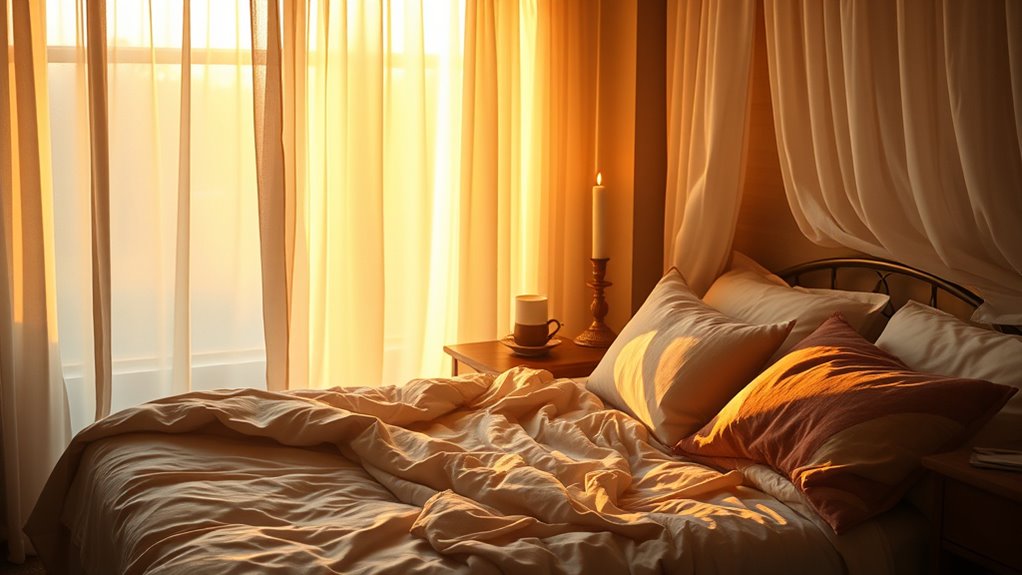Your environment plays a key role in your sleep and mood. Exposure to natural light helps regulate melatonin and boosts your mood, while too much artificial light at night can delay sleep. Keeping noise levels low and using sound masking or noise-canceling devices can improve rest and reduce irritability. Maintaining a comfortable temperature, ensuring good ventilation, and keeping your space organized create a calming atmosphere. Plus, calming aromas and sensory cues can promote relaxation—discover how these changes can transform your well-being.
Key Takeaways
- Adequate daytime light exposure helps regulate melatonin, improving alertness and mood regulation.
- Proper temperature, ventilation, and noise control create a comfortable environment that promotes restful sleep and emotional stability.
- Reducing clutter and organizing the bedroom fosters relaxation, reducing stress and improving sleep quality.
- Using calming aromas and sensory cues enhances relaxation, making it easier to fall asleep and maintain good mood.
- Managing light at night and minimizing artificial disruptions support natural sleep cycles, positively affecting mood and emotional health.
The Impact of Light on Sleep and Emotional Well-Being
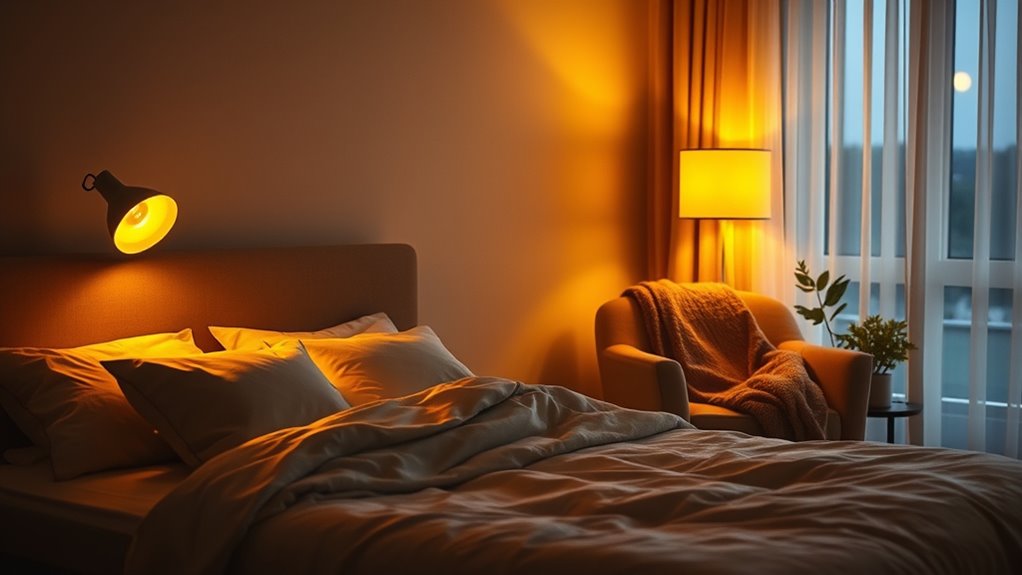
Light plays a crucial role in regulating your sleep and emotional health. When you get enough light exposure during the day, it helps your body maintain proper melatonin regulation, ensuring you feel alert and awake. Exposure to natural sunlight boosts your mood and helps set your internal clock, making it easier to fall asleep at night. Conversely, too much artificial light in the evening can disrupt melatonin production, delaying sleep and causing fatigue. By managing your light environment—seeking sunlight during the day and dimming lights at night—you support healthier sleep patterns and emotional stability. Consistent light exposure helps your body synchronize with natural cycles, promoting both restful sleep and a balanced mood. Additionally, understanding the effects of light on sleep can help you develop better habits for overall well-being.
Noise Levels and Their Effect on Rest and Mood
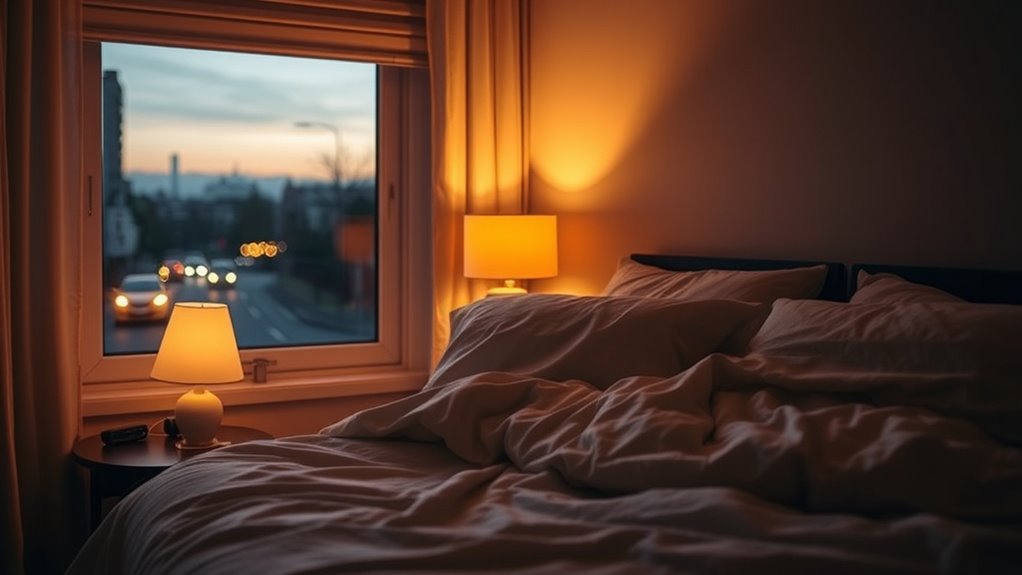
Noise levels in your environment can considerably influence both your ability to rest and your mood. Excessive noise disrupts your sleep cycles, making it harder to fall asleep and stay asleep. To combat this, sound masking can be effective, creating a consistent background sound that drowns out disruptive noises. Noise cancellation technology also helps by actively reducing external sounds, providing a quieter sleep environment. When your surroundings are noisy, you may experience increased stress and irritability, negatively impacting your mood. By controlling noise levels through these methods, you promote deeper, more restorative sleep and support a more stable emotional state. Managing sound in your environment isn’t just about comfort—it’s essential for your overall sleep quality and mental well-being. Additionally, integrating security systems with smart home devices can further help monitor and manage noise disruptions effectively.
The Role of Temperature and Ventilation in Sleep Quality
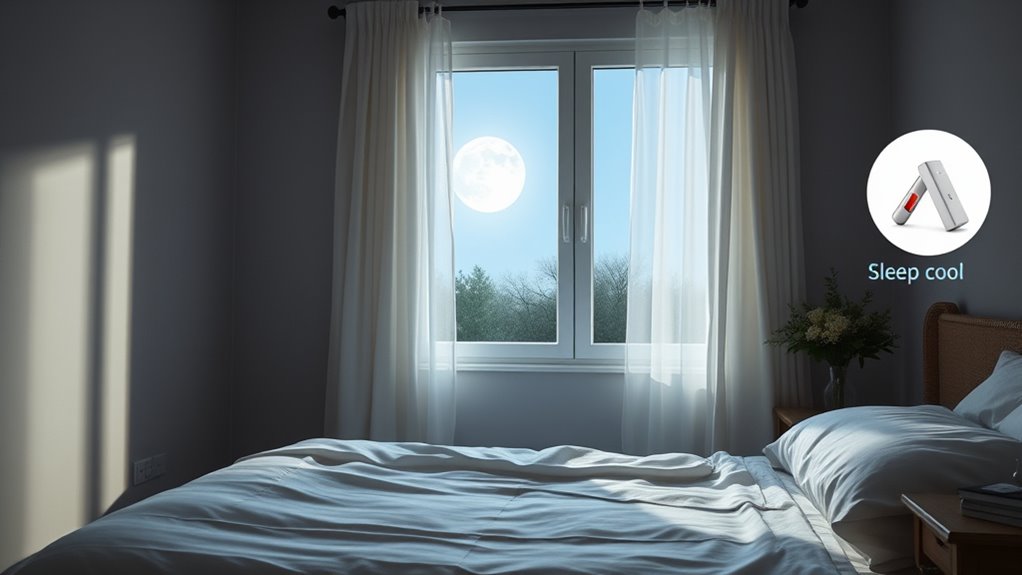
Maintaining the right temperature and guaranteeing proper ventilation are crucial factors that directly impact your sleep quality. Your body relies on thermoregulation to stay comfortable; if your environment is too hot or cold, your body struggles to cool down or warm up effectively, disrupting sleep cycles. Proper airflow helps regulate room temperature and prevent stuffiness, which can cause restless nights. When ventilation is inadequate, humidity levels may rise, creating an uncomfortable sleeping environment that hampers deep sleep. Conversely, a well-ventilated room promotes fresh air exchange, supports thermoregulation, and keeps you comfortable throughout the night. Paying attention to these factors ensures your body can maintain ideal temperature and airflow, leading to more restful sleep and a better mood during the day. Additionally, incorporating digital literacy programs can help seniors better understand and utilize smart devices that monitor and optimize their sleep environment.
Clutter and Organization: Creating a Calm Sleep Environment
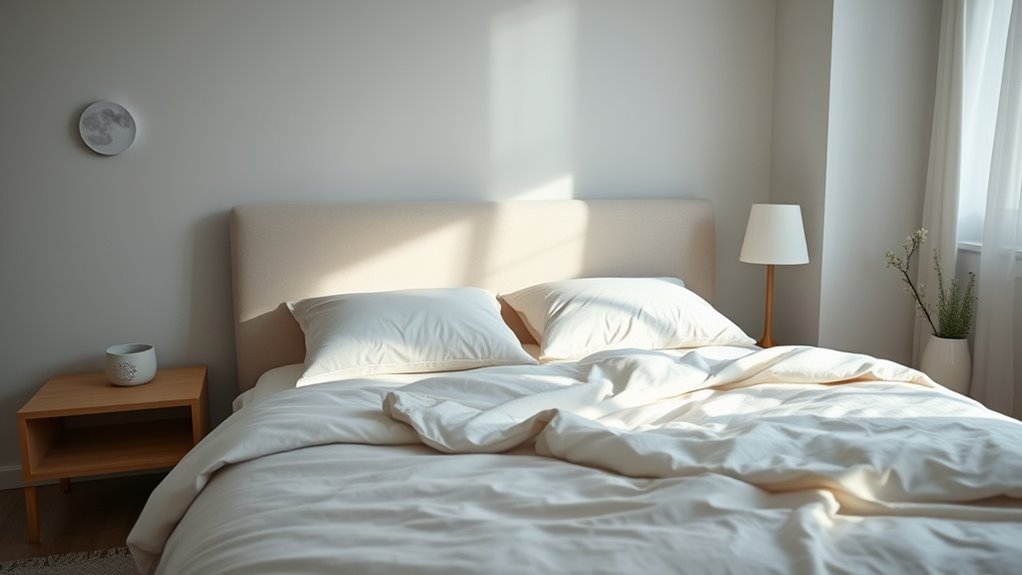
A tidy, organized bedroom creates a peaceful environment that makes it easier to fall asleep and stay asleep. When you practice sleep zone decluttering, you reduce stress and promote better rest. Incorporate bedroom feng shui principles by arranging furniture to allow energy flow and removing unnecessary clutter. Keep surfaces clear and store items out of sight to create a calming space. Here’s a simple guide:
| Clutter Type | Organization Tip |
|---|---|
| Clothing & Linens | Use drawers or baskets, fold neatly |
| Personal Items | Store in designated containers |
| Excess Decor | Limit decorations for simplicity |
A clean, organized space signals your brain it’s time to relax, helping improve your mood and sleep quality. Additionally, choosing appropriate dog names can foster a sense of comfort and familiarity in your living environment, contributing to a more restful atmosphere.
Aromas and Sensory Cues That Promote Relaxation
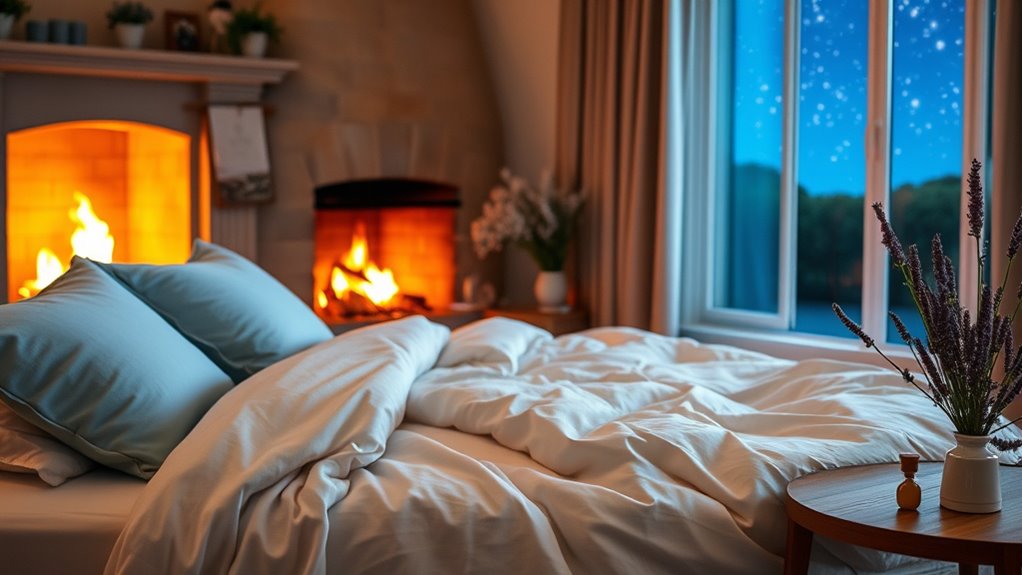
Incorporating soothing aromas and sensory cues into your bedtime routine can substantially enhance relaxation and prepare your mind for restful sleep. Aromatherapy benefits are well-documented, helping to reduce stress and promote calmness. To maximize these effects, try these sensory relaxation techniques:
- Use essential oils like lavender or chamomile in a diffuser.
- Place a scented pillow or eye mask infused with calming aromas.
- Incorporate gentle sounds, such as nature or white noise, alongside aroma cues.
- Keep your bedroom cool and dark to enhance sensory comfort.
- Being mindful of your spiritual energy can further deepen your relaxation, creating a more harmonious environment for sleep.
These simple steps create a relaxing environment that signals your body to wind down. Engaging multiple senses not only relaxes your mind but also reinforces a consistent sleep routine, aiding in better sleep quality.
Frequently Asked Questions
How Does Sleep Environment Influence Long-Term Mental Health?
Your sleep environment profoundly impacts your long-term mental health by regulating your circadian rhythms and supporting good sleep hygiene. A dark, quiet, and cool space helps maintain consistent sleep patterns, reducing stress and mood swings. When you prioritize a healthy sleep environment, you improve sleep quality, which boosts mood stability and resilience over time. Neglecting these factors can lead to chronic sleep issues, negatively affecting your mental well-being.
Can Sleep Environment Modifications Improve Specific Mood Disorders?
Yes, improving your sleep environment can help with mood disorders. Focusing on sleep hygiene by creating a dark, quiet space promotes better sleep quality. Managing light exposure, especially reducing blue light before bed, helps regulate your circadian rhythm. These changes can stabilize your mood, reduce anxiety, and improve overall mental health by supporting healthier sleep patterns and reducing stress that exacerbates mood disorders.
What Are the Best Practices for Customizing Sleep Settings for Individual Needs?
Forget one-size-fits-all sleep tips—you’re unique, so your sleep settings should be too. Dial in your adjustable sleep settings to match your ideal temperature, lighting, and noise levels. Create personalized sleep routines that fit your schedule and comfort needs. Experiment with different bedtimes and environment tweaks until you hit that perfect snooze button. After all, if sleep were a cookie cutter, everyone would be napping identically—thankfully, you’re not!
How Do Seasonal Changes Affect Sleep Environment Adjustments?
Seasonal changes influence your sleep environment through seasonal lighting and temperature regulation. During winter, you might need to use blackout curtains and warmer bedding to combat shorter days and colder nights. In summer, opt for lighter bedding, cooler temperatures, and blackout curtains to reduce heat and light. Adjust your environment accordingly to maintain ideal sleep conditions year-round, ensuring you’re comfortable regardless of the season’s impact.
Are There Technological Tools to Optimize Sleep Environment for Mood Enhancement?
Yes, you can use technological tools like smart alarm clocks and sleep tracking devices to optimize your sleep environment for mood enhancement. Smart alarm clocks gently wake you during light sleep, helping you start the day refreshed, while sleep trackers monitor your sleep patterns, providing insights to improve your environment. By adjusting lighting, temperature, or bedtime routines based on this data, you create a more mood-friendly sleep setting.
Conclusion
By paying attention to your environment, you can improve both your sleep and mood. Adjusting light, noise, temperature, and clutter helps create a calming space where relaxation comes naturally. Incorporate soothing scents to further enhance your rest. Remember, a peaceful environment is the foundation for a good night’s sleep and a better mood. When it comes to your well-being, don’t overlook the little things—sometimes, a small change can make all the difference in the world.
